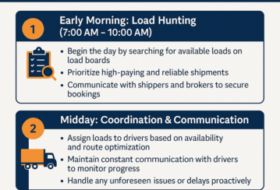Freight Broker Certification Courses: Becoming a Certified Professional in the Logistics Industry
Freight brokerage plays a vital role in the logistics industry, connecting shippers and carriers to ensure efficient transportation of goods. In this post, we will explore the world of freight broker certification courses, their importance, benefits, and how to choose the right course to enhance your career prospects.
- Importance of Certification in the Freight Broker Industry
- Certification serves as a testament to your knowledge and expertise in freight brokerage.
- It provides credibility and trust among clients, carriers, and industry stakeholders.
- Certified freight brokers have a competitive edge over non-certified professionals.
- Many shippers and carriers prefer working with certified brokers due to their industry-recognized qualifications.
- Benefits of Becoming a Certified Freight Broker
- Increased earning potential: Certified brokers often command higher commissions and fees.
- Enhanced marketability: Certification distinguishes you from non-certified brokers in the industry.
- Access to networking opportunities: Certification programs often provide access to industry events and networks.
- Skill development: Certification courses offer in-depth knowledge and practical skills necessary for success in freight brokerage.
- Overview of the Certification Process
- Research: Start by exploring different certification programs available in the market.
- Eligibility: Understand the prerequisites and requirements for enrollment in the certification course.
- Course content: Evaluate the curriculum, ensuring it covers essential topics such as regulations, contracts, and operations.
- Instructor qualifications: Consider the expertise and experience of the instructors delivering the course.
- Choosing the Right Freight Broker Certification Course a. Factors to consider when selecting a certification course
- Reputation and accreditation: Look for programs accredited by recognized organizations in the industry.
- Industry recognition: Check if the certification is widely accepted and valued by shippers and carriers.
- Curriculum comprehensiveness: Ensure the course covers key aspects of freight brokerage, including sales, operations, and legal requirements.
- Flexibility: Consider if the course offers options for online learning or part-time study.
- Verify the certification course’s accreditation by reputable organizations such as the Transportation Intermediaries Association (TIA).
- Research the industry’s perspective on the certification to understand its value and recognition.
- Review the course syllabus to ensure it covers essential topics such as freight operations, legal compliance, and sales techniques.
- Look for real-world case studies and practical exercises to enhance your understanding of the concepts.
- Assess the instructors’ qualifications, industry experience, and their ability to effectively teach and engage students.
- Check for any additional certifications or achievements that demonstrate their expertise in freight brokerage.
Conclusion: Investing in a freight broker certification course can be a game-changer for your career in the logistics industry. By becoming a certified professional, you gain the necessary skills, knowledge, and industry recognition to thrive in this competitive field. Choose the right certification course that aligns with your goals and embark on a journey towards success in freight brokerage.
Growth + Change = Opportunity! How are you going to capitalize on the opportunity as a freight broker, agent, dispatcher or box truck carrier?








